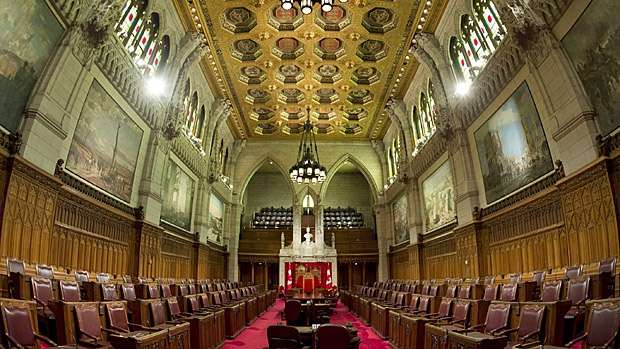On a class trip in high school, I became one of the relatively few people in Canadian history to sit at a Senator’s desk. From the wood-and-leather chair, I admired the richly-adorned chamber that the media often calls useless and old-fashioned. As my final year of high school progressed, the more politically-inclined among us started throwing around the buzzword of Senate reform advocates in Canada: “Triple-E,” which stands for equal, elected, and effective.
To most people—save perhaps those from Quebec and Ontario—the Senate’s current composition is manifestly silly. British Columbia, with a population of over 4 million, has six Senators, while Nova Scotia’s 10 Senators represent fewer than one million. New Brunswick also has 10 Senators, but a population of only 750,000 people. The current scheme of representation, fairly appropriate in 1867, has over time evolved into a haphazard mixture of representation by region and representation by population, resulting in serious asymmetry between regions. Given that representation in the House of Commons is allocated by population, it seems logical that Senate seats be allocated equally between regions. There are 105 seats in the Senate; we could, for example, give each province and territory eight, filling 104 seats, and the last could remain vacant or be removed.
Past equality, however, Triple-E has little merit: an effective Senate and an elected Senate are in direct opposition.
An effective Senate fulfills four roles: debate, regional representation, protection from tyranny, and investigation. First and foremost, the Senate was conceived as a body of “sober second thought”—insulated from majority dictates and populist currents, it debates without time limits and passes, amends, or rejects legislation only after careful consideration of its costs, benefits, and consequences.
Second, it represents regional interests in federal matters. This role has been severely weakened, and is in real need of reform.
Third, the Senate’s legislative oversight protects against the potential tyranny of a prime minister with a majority government, who could otherwise rule unopposed. This power is even more important today, given the massive centralization of power in the prime minister’s office over the past eight years.
The Senate’s fourth role is to investigate and inform government policy. In this, it has been especially effective, leading some to call it “Canada’s best think-tank.” Its luxury of time allows for thorough research and expert witnesses, while the lack of usual partisan bickering means that Senate Commissions stay focused and make recommendations based on evidence and sound reasoning.
Elections would interfere with all of these roles by removing the insulation the Senate requires—the party politics of elections replace debate and regionality with partisan rhetoric, oversight with overlook, and research with selective hearing. At best, the Senate would become distracted by the next campaign. At worst, it could devolve into a dysfunctional den of division and obstinance, as in the United States.
Longer terms of office could offset this but still end in a year-and-a-half of diminished function in the run-up to voting day. Rotating eligibility—also seen in the U.S.—compounds the problem by ensuring that some part of the Senate is busy campaigning instead of doing its job at any given time. Life terms sidestep this problem but lock in the partisanship of elections.
Many today complain about partisan hacks being appointed to the Senate—but are elections really going to make this better? Or, given the growing polarization of Canadian party politics, are they more likely to result in a divided Senate incapable of anything approaching cooperation?
Critics of Senate appointments come from two schools: those who don’t like appointment and those who don’t like the appointees. The first school results in less-effective government, which I don’t particularly care for. Nor are elections the answer to the second school, since party machines are unlikely to support anyone not a party loyalist. But here’s one possible solution: make membership in the Order of Canada a requirement for new appointees. Who better to fill our upper chamber than those who exemplify the motto “They desire a better country”? The selection committee is apolitical, and the inductees have shown their capability and drive. I can think of no group more qualified or better-suited.
In Canada’s appointed Senate we can have convenient insulation from popular whim and pointless partisanship, something we should not abandon lightly. An elected Senate would be far from an improvement.








